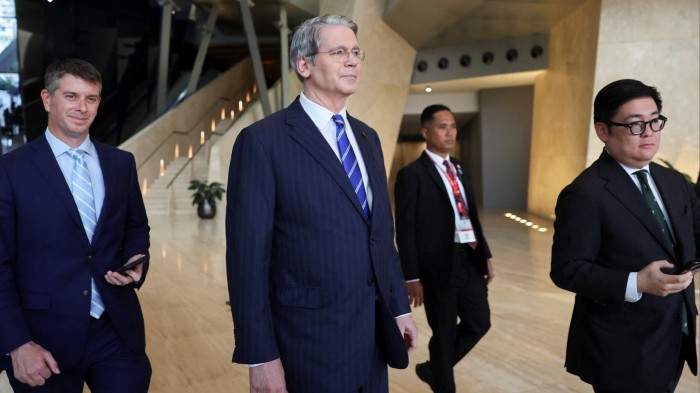Unlock the White House Watch newsletter for free
Your guide to what Trump’s second term means for Washington, business and the world
The US and China have agreed on “a very positive” framework for Donald Trump and Xi Jinping’s high-stakes summit this week, Treasury secretary Scott Bessent said on Sunday, raising hopes the sides will extend a trade truce that is set to expire next month.
Following weeks of mounting trade tensions between the world’s biggest economies, Bessent and Chinese vice-premier He Lifeng held a second day of talks in Malaysia ahead of the first summit between Trump and Xi since 2019.
“I would describe [the negotiations] as constructive, far-reaching, in-depth and giving us the ability to move forward and set the stage for the leaders’ meeting in a very positive framework,” Bessent said.
Asked if the two countries could extend a truce, which is set to expire on November 10, Bessent said: “I would say yes”, but cautioned that Trump, who arrived in Malaysia on Sunday, would make a final decision for the US.
China’s state news agency Xinhua said that the sides had reached a “basic consensus” on a framework to “address their respective concerns”.
It added that the two days of talks had covered exports controls, levies against Chinese shipping, fentanyl and trade in agricultural products.
Bessent’s comments came as Trump kicked off a week-long trip to Asia, his first since returning to the White House, by signing regional trade and critical minerals deals.
The US struck trade and critical mineral deals with Malaysia and Cambodia on Sunday. As a result, the two countries will now face a tariff of 19 per cent on their exports to the US, down from as high as 49 per cent when Trump kicked off his trade war in April.
The US president also said Washington had reached a framework for a trade and critical minerals deal with Thailand.
“We are also signing a major trade deal with Cambodia and a very important critical minerals agreement with Thailand,” he said.
In a day of frantic diplomacy, Trump presided over the signing of a ceasefire agreement between Cambodia and Thailand after the neighbours were embroiled in a deadly border dispute this summer.
Malaysia is the first stop on Trump’s Asian tour before he flies to Japan and then heads to South Korea for the summit with Xi.
His visit comes as trade tensions between Washington and Beijing have erupted this month.
Beijing announced sweeping export controls on rare earths, prompting Trump to threaten an extra 100 per cent tariff on Chinese goods from November 1 and raising the risk of a return to a full-blown trade war.
China has given no public signs it will roll back the planned export controls, which have sparked intense criticism from the US and its allies for their impact on global supply chains.
Beijing has defended its restrictions on rare earths, which are vital to the manufacture of fighter jets, electric vehicles and smartphones, by accusing Washington of putting Chinese companies on an export blacklist.
The spectre of a trade war between the US and China has loomed over the global economy since April, when the White House hit Beijing with 145 per cent tariffs and Xi retaliated by slapping 125 per cent levies on US exports.
Beijing subsequently reached a truce to pause the duties that in August was extended to November 10.
Trump landed in Malaysia a day after he put an extra 10 per cent tariff on Canadian goods in response to a television advert that quoted former US president Ronald Reagan opposing tariffs. Canadian Prime Minister Mark Carney is also attending the Asean summit, but Trump said he had no plans to meet him.
Recommended
At the signing of the ceasefire agreement in Kuala Lumpur on Sunday, Trump took credit for co-ordinating peace talks between Cambodia and Thailand.
“You shouldn’t say it’s a hobby, because [it’s] so much more serious than a hobby, but it’s something that I’m good at and it’s something I love to do,” he said.
Taking a page from the playbook of other leaders who have tried to flatter Trump, Cambodian Prime Minister Hun Manet said he had nominated the US president for the Nobel Peace Prize.
In recent weeks, Trump has complained about not receiving the prize this year for his role in bringing about the ceasefire deal in Gaza.


